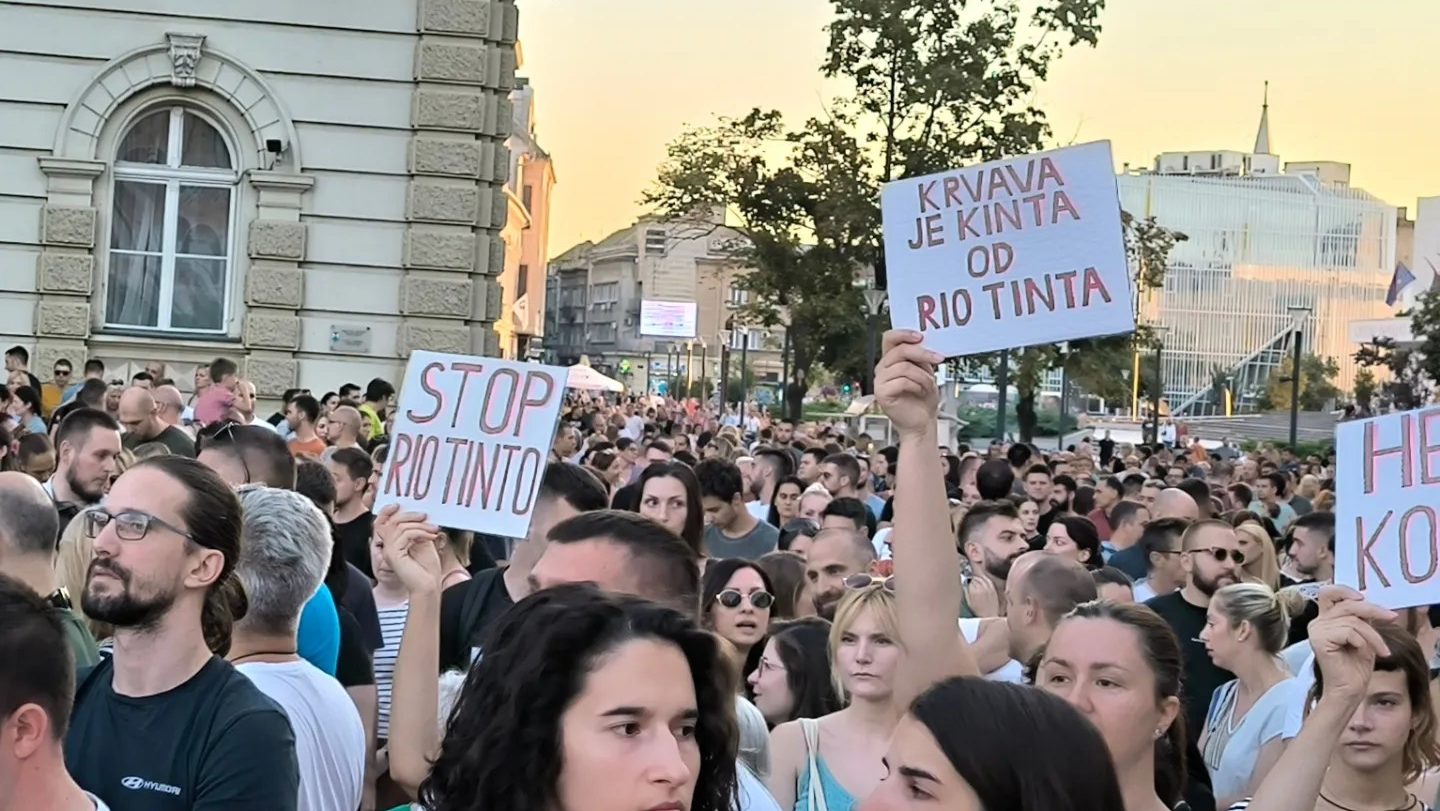In 2021, Serbia experienced a significant wave of environmental protests, that led to widespread blockades across the country. For the first time in a decade, the Serbian government conceded and called off Rio Tinto’s "Jadar Project," which aimed to explore and mine lithium.
Rio Tinto, a British-Australian multinational company, had been researching the Jadar Valley in Western Serbia, uncovering one of Europe’s largest lithium reserves While the company was preparing to start extraction of lithium from jadarite, an invasive method that may lead to high pollution, eco-activists began raising concerns about the project’s potential ecological impact.
In response to the protests and growing environmental concerns, the Serbian government imposed to stop all exploration and related activities by Rio Sava Explorations, Rio Tinto’s Serbian branch.
However, in July 2024, the Constitutional Court of Serbia overturned this decision. Just days later, Serbia signed the Memorandum of Understanding on a strategic partnership on sustainable raw materials, battery value chains and electric vehicles with signatures with the EU.
This agreement, attended by high-level representatives from the Serbian government, European Commission Vice-President Maros Sevcovic and German Chancellor Olaf Scholz, effectively gave Rio Tinto the green light to resume its exploration activities.
The revival of Rio Tinto's lithium mining project in Serbia highlights the tension between Serbian citizens and European economic interests, positioning Serbia at the crossroads of European strategic goals and domestic democratic challenges.
Serbian Government’s position on lithium mining project
The Serbian government has consistently supported the lithium mining project from the very start, taking significant steps to secure its advancement. In addition to resuming the project by signing the memorandum with the EU, the government has taken several unusual actions.
First, President Vucic has controversily tied his political fate to the project by proposing a referendum on his impeachment, rather than on the lithium mining itself, an approach not grounded in constitutional provisions.
Furthermore, Prime Minister Vuceic recently marked the International Day of Miners with a video message celebrating Serbia’s mining heritage and future. Although he did not explicitly mention Rio Tinto or the Jadar project directly, the message implicitly endorsed the mining sector’s importance.
Perhaps most strikingly, the Ministry of Mining and Energy established a call center dedicated to informing citizens about lithium mining and the Jadar project. Minister Dubravka Djedovic Handavic personally answered some of the calls for a day, a practice that positions the government as a de facto PR agency for a foreign multinational corporation.
Renewed Protests with a Caveat
Following the official restart of the Jadar project, public discontent surged, leading to 37 protests organized by ecological groups and activists across Serbia throughout the summer.
Protests took place in Belgrade, where tens of thousands of protestors raised their dissatisfaction with the Constitutional Court’s decision and the continuation of the lithium mining project.
The protestors also blocked the main railway station in Belgrade, a strategy that proved to work in 2021 when ecological protestors blocked major highways and motorways in the country which forced the government to suspend the Jadar project.
However, it remains uncertain whether these protests can achieve the same success as in 2021. Despite widespread support for the protests, several factors might crucially influence the protest's outcome.
First, the explicit support of the EU and Germany for the project complicates efforts to pressure the Serbian government and president into abandoning the project again. The EU, driven by its Strategic Autonomy, geopolitical concerns and trade tensions with China, is keen to secure lithium for its car industry from the neighborhood, avoiding dependence on imports from Africa or Asia.
Second, lithium is crucial for Germany’s car industry which is losing the race with China’s electric vehicles (EVs). The European Green Deal also aims to reduce greenhouse gas emissions by 55% by 2030 and achieve zero emissions by 2050, making lithium crucial to these targets.
Considering the EU’s and Germany’s direct economic and political interests, Serbian protestors find themselves without Western support.
EU-Serbia transactional relationship
The EU’s approach to Serbia is becoming increasingly pragmatic and interest-driven, often at the expense of its core values and democratic principles.
The EU has long been criticized for its support for stabilitocracy in the Western Balkans, prioritizing stability over democracy by backing authoritarian regimes. In the case of Serbia, it appears the EU is willing to overlook democratic deficiencies in exchange for securing the strategic supply of lithium.
Given the EU’s previous silence on issues such as electoral irregularities and the lack of progress on democratic reforms, it is likely that this transactional relationship will continue.
Politico writes that Vucic has already secured support from the West, positioning himself as the EU’s favorite Western Balkan leader. Vucic is seizing this opportunity for a political crackdown on ecological activists. Serbian police have arrested several activists, accusing them of attempting to overthrow the constitutional order of Serbia by organizing and participating in anti-lithium protests, with some of them facing intimidation by the secret service.
New York Times writes the lithium project has become a proxy battleground in the West’s efforts to extract the country from the influence of Russia and China.
While Vucic enjoys support from both the EU and the US, China and Russia are attempting to frame ecological activists as instigators of a ”color revolution” and a threat to Serbia’s political order.
The lithium mining project has become a highly sensitive socio-political issue in Serbia, deeply polarizing the society. The future outcome of protests remains to be seen, but one thing is clear, the EU’s transactional behavior is strictly focused on its interests, completely neglecting democratic standards and Serbian citizens’ demands on this issue.
The EU has found an ally in Vucic, who is likely to use this opportunity to solidify its position and continue cracking down on any form of opposition.





























































